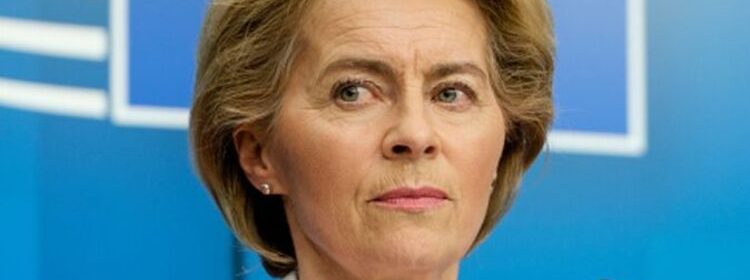Denmark to hold emergency referendum after EU ploy to gain more power over states

Russia: Ukraine 'stunned' by 'lack of efficiency' says Weichert
We use your sign-up to provide content in ways you’ve consented to and to improve our understanding of you. This may include adverts from us and 3rd parties based on our understanding. You can unsubscribe at any time. More info
Denmark will hold a vote on June 1 on whether to begin participating in a common European Union defence policy following Russia’s invasion of Ukraine, almost 30 years after Danes chose to opt out.
Since Russian President Vladimir Putin launched what he calls a special military operation in Ukraine, Danish lawmakers have called for Denmark to hike its defence budget and to quit the opt-out from the EU’s Common Security and Defence Policy (CSDP).
Participating in the CSDP would enable Denmark to take part in joint EU military operations and to cooperate on development and acquisition of military capabilities within the EU framework.
It would also allow Denmark, a NATO member, to participate in decisions and planning in this area.
Denmark won exemptions from some EU policy areas, including the euro currency and defence and security policy, in a 1992 referendum on the Maastricht Treaty that laid the groundwork for the modern European Union.

Praising the EU member state for its decision, the Bresit-supportive Democracy Movement wrote: “Denmark’s government has called a rushed referendum on 1 June to try to remove the country’s opt-out from EU military projects.
“Using a crisis to push for more powers and diminish democracy is a classic pro-EU ploy.
“Let’s hope there’s a big ‘No’ to such obvious opportunism!
“The EU’s new ‘Strategic Compass’ doctrine calls for a ‘rapid deployment’ force of 5,000 troops and a stronger EU weapons industry, under a vague ‘rapid and more flexible decision-making process’.
“EU foreign policy chief Josep Borrell has said: ‘This is only the beginning’.
“None of these plans would have prevented Putin’s aggression against Ukraine.
READ MORE: Putin turns on ‘misleading’ military leaders
“So why this sudden rush to delete Denmark’s reserved defence powers? There is no connection, beyond simply using the shock and fear of war to push for more governance to be handed to the EU.
“Denmark is already a valued partner in military and defence co-operation with EU members plus UK & others beyond, for example in the Joint Expeditionary Force and of course NATO.
“Defence co-operation is not just possible but often better beyond the EU’s flawed institutions.
“Back in the UK’s 2016 referendum, an EU army was called a “dangerous fantasy” by EU supporters. EU leaders have since been very clear about what they are building towards, yet far less clear about who will be commanding EU troops into their battles.”
On Monday, March 21, EU foreign and defence ministers agreed a security strategy meant to boost the bloc’s military clout when war has returned to Europe, establishing a rapid reaction force with up to 5,000 of troops to be swiftly deployed in a crisis.
DON’T MISS:
Putin ‘misjudged’ Russian troops capabilities, says top spy chief [INSIGHT]
Ukraine LIVE: Boris considering daring Mariupol rescue mission [LIVE BLOG]
Kadyrov brags about Ukraine conflict but online post put him in Russia [VIDEO]

“The threats are rising and the cost of inaction is clear,” the EU’s foreign policy chief Josep Borrell said in a statement, calling the document that sets out European ambitions in defence and security to be reached by 2030 a “guide to action”.
Work on the strategy started in 2020, before the pandemic, a chaotic withdrawal from Afghanistan and the Ukraine war. After Russia’s invasion of Ukraine began, the EU toughened its language on Moscow.
“The EU needs to be able to protect its citizens and to contribute to international peace and security,” the bloc said in a statement.
“This is all the more important at a time when war has returned to Europe, following the unjustified and unprovoked Russian aggression against Ukraine, as well as of major geopolitical shifts.”
Russia has described its invasion as a “special military operation” to disarm Ukraine.
At the same time, the EU has made it clear it sees its efforts as complementary to the North Atlantic Treaty Organisation (NATO) and not intended to compete with the US-led military alliance as an anchor of Western defence.
Germany is ready to provide the core of the EU’s new rapid reaction force in 2025, the year it is meant to become fully operational, Defence Minister Christine Lambrecht said in Brussels.
The force will replace the existing EU battlegroups that the bloc has had since 2007 but never used. Plans for an overhaul gained traction after European countries struggled to handle the chaotic withdrawal from Kabul in August.
Source: Read Full Article
